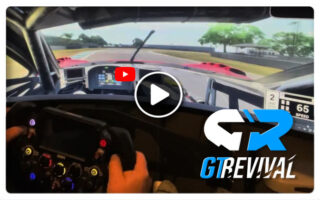
These days, too often it is forgotten how the current exploding Sim Racing industry and with it the current professional sport with organized competitions and leagues, originated out of the hard work and passion of an old but gold community including modding teams, websites, forums, file databases, chat channels, and so on.
While first of all, modding teams had turned the humble race game into a full-blown sim racing hobby for gaming motorsport enthusiasts, the popularity growth was fueled by a number of websites and forums such as Race Sim Central, GT-Planet, Race Department, Virtual-R, NoGrip Racing, Driving Italia, rFactor Central, Black Hole Motor Sports, and your humble Bsimracing to name a few. Needless to say, there were many more.
And let’s not forget Inside Sim Racing by Darin Gangi and Shaun Cole for igniting the world of dedicated sim racing YouTube channels, as we now have become accustomed to.
It is safe to say that the mother of all these Sim Racing communities was the Race Sim Central (RSC) crowd. For somewhat older sim racers the name Tim Wheatley will surely ring a bell. Tim founded the website that would later on become RSC. The massively popular Race Sim Central provided a platform for players to share tips and tricks, organize races, and discuss news, updates, and sim racing hardware spanning all of the available titles available at the time. In 2005 Tim left RSC to focus on his job at iRacing. com. Tim also worked at Image Space Incorporated, Studio 397, rFpro, and Motorsport Games to name a few.
So now I am delighted to see the name Tim Wheatley pop up as a new staff member of Ian Bell’s new Straight4 game studio.
Mr. Bell came a long way since the early days of sim racing, when in 2001 he co-founded the SimBin modding team which produced a number of successful free add-ons for various racing games, culminating in the highly popular GTR2002 mod. The SimBin modding group, later on, became the foundation for the famed SimBin Studios who were responsible for the original GTR, and the GTR 2 FIA GT Racing Game. In 2009 Ian Bell became CEO, and founder of Slightly Mad Studios, the company behind era-defining games such as the GTR series, Need For Speed Shift, Shift 2 Unleashed Red Bull Air Race, the popular Project CARS franchise, and many other top-tier games.
Back in November of 2022, Ian announced that he founded a new studio branding named Straight4Games or just plain Straight4. The studio is currently working on a new sim racing title ( Project name GTRevival) and now attracted Tim Wheatley to become Head of Licensing and Community Management at Straight4.
Tim Wheatley Interview:
If we talk about the history of sim racing—and you’re probably sim racing’s most noted historian! Tim Wheatley’s name would get a mention, right? You became famous with Race Sim Central, the biggest sim racing site in the ’90s-’00s. Any amusing anecdotes (aside from having banned the Head of Comms at Straight4 on about a dozen occasions!)?
TW: I don’t know if famous is the right word, but for a long time I was asked if I was “The Tim from RSC” whenever I’d contact an aging sim racer (like me!). RSC did a lot for my career, and it still does. As for banning the Head of Comms from Straight4, I plead the Fifth! (Though I don’t remember banning him!).
Starting in the mid-’00s, you went on from RSC to work for every major sim racing developer in the world. What’s the key thing you’ve learned from that journey?
TW: I’ve worked at iRacing, Image Space Incorporated, Studio 397, had a couple of years with rFpro, then went back to Studio 397 again, and wound up at Motorsport Games, and now I’m at Straight4, so yes, you could say I’ve seen the behind-the-scenes working of every sim racing studio. What did I learn? First off, I’m still blown away by how skilled and intelligent everyone I have worked with is. It’s an industry driven by passion, both from the developers and the community, and that sometimes also explains how things can get so rowdy so quickly!
The other big thing I learned and that I try to pass on to any studio I work at is to occasionally let things go. I’ve seen years of development lost on features that were eventually dropped when it really should have been obvious from the first few months that there wasn’t a way to make it work. Whether the mistake begins with the design document or later, it’s important to be brave enough to sometimes just drop a feature after a year or two when it’s clear it’s never going to be implemented. Sim racing developers tend to be smallish studios and teams, and going down dead-ends can limit development on other aspects of the sim.
You’ve been in this community for close to thirty years now. What’s changed? What remains the same? And where are we headed?
TW: I feel spoiled for choice right now when it comes to sim racing, and I don’t ever really remember it being that way in the past. While we have a little bit of tribalism between some closed and open communities, you do see most people sim racers interchanging between sims depending on what they’re in the mood for. That’s refreshing. One of the things I tried to do with RSC (or Legends Central as it was then known) was to have forums for every sim to bring the community together and stop the in-fighting (or ‘flame wars’ as we called them back then) that the community has always struggled with.
The thing that remains the same, shockingly so, in my opinion, are the underlying engines used in all the top racing simulations today. It’s amazing that pretty much every engine has roots that are twenty-or-more years old. Even Unreal, which is a newly used engine core, harks back to a ’90s shooter. Then you have little bits of code, such as Terence Groening’s suspension code, that’s still being used by certain studios because it just works so well—but that’s over two decades old! There’s a push now, I think, from major studios such as Straight4 to bring our simulation engines into the 2020s, and that’s important. Just think of how the world has changed from the year 2000 to today: Our audience wasn’t even born when most of our sim engines were developed!
Another aspect I think is important is that studios need to be thinking about the aging sim racers. I’m hopeful that we’ll see single-player options re-emerge because they’ve been neglected for the last decade. Sure, nothing beats that feeling of racing another human, but as the sim racing community gradually ages and we find ourselves with families and little time for our passion, we have to find a way to race that doesn’t result in our lack of practice time ruining someone else’s race online.
We’re coming into another very busy few years in sim racing, I think. It’s kind of cyclical, where you get years like’05-’10 when there’s an astonishing amount of invention and then studios seemingly taking a decade’s hiatus, and then there’s suddenly a massive push to bring in a whole new evolution of the industry. It’s understandable, of course, because the amount of work needed to create a whole new physics engine, for example, means other features get neglected and that could seriously impact a studio’s finances. But I sense the titles we’re about to see in the next couple of years will influence the direction of our industry for the next decade, much like GTR did to the industry back in ’06, for example.
You’ve come on board as Head of Licensing & Community Management. Back in the old days, getting licenses was all about developers asking (and sometimes begging) manufacturers for rights. Do you think manufacturers look at our industry differently now?
TW: You have motoring brands involved at all levels of sim racing now, and there’s absolutely a far greater understanding, acceptance, and even appreciation of what sim racing is. These days, most major brands have a dedicated licensing department where, even just ten years ago, you’d have to explain gaming, racing games, sim racing, gaming platforms and everything in between to someone who’d never even heard of sim racing. I’m very excited about the planned and in-progress content for our game and delighted to be working with these manufacturers and owners. They get what we’re doing now, and they share our passion for motorsport and car culture. It’s really an enormous change from where we were a decade ago.
When you started playing sim racing games, did you ever imagine you’d wind up in a career making games? And if some of the younger community members had to ask, “What’s the best way to get into this industry?”, what would be your advice?
TW: No, I had no idea this would be where life took me at all. It happened by accident really, and it was just a case of getting noticed. John Henry (co-founder of iRacing) saw me dealing with a series of issues between communities on RSC and basically told iRacing they should hire me because I’d be an asset within the community.
And that’s really my advice to anyone who’s thinking about a career in this crazy industry. You just need to be passionate about your area of interest and get involved in any way you can. Building a portfolio is important, and RSC, along with the interactions within it, was mine. Whether you build yourself a portfolio of 3D models, build car and track mods from scratch right now for the two major sims where the modding community hangs out, or build a simple racing game, I think any studio would look at that before academics. The amount of highly-skilled-yet-self-taught people in this industry is very high. And studios such as Straight4 always hire from within the community: everyone from the guy who did the trailers on Project CARS (and who now works for one of the world’s biggest video game developers) to AJ Weber (who now leads our physics team) came through our community.
Race Sim Central has been around for almost a quarter of a century, but your involvement went into a hiatus for many years. You’re back now and running it as a virtual museum to sim racing: Can you tell us a little about this awesome project?
TW: I reacquired the site in 2019 and re-opened it that summer with the idea to index every sim title ever made. I then, perhaps insanely, decided to index every car and every track, too! I have a list of studios, software, cars, bikes, and tracks that all connect with each other, so if you want to see every sim that ever included Indianapolis or Silverstone, you can find it in a second.
The site has some cool features that I’m building out bit by bit. Certain sims, mostly the DOS-based ones, can be played within the Website from your browser with an embedded version of DOSBOX. For other sims, I’ve scanned the boxes and embedded those as 3D models where you can spin them around, zoom in, and see the exact box I have sat on my shelves.
My favorite articles on the site are written about old hardware and canceled sims. They require a lot of research and it’s that chase and acquisition of information and evidence that’s really cool and exciting. I also own every video card that was ever released with native support for a racing game with chips by Rendition, Power VR, Creative, and more, before Direct 3D (what became Direct X) was the dominant graphics pipeline.
It’s a very long-term project and I don’t have nearly enough free time to dedicate to it as I would like, but I’m constantly tinkering and figuring out how to improve my PHP coding (I’m self-taught) or posting current news. I also have hard drives crammed with decades of files and I’m slowly uploading older news, videos, and images as and when I can.
Our industry, as I said, is about passion. That’s why I’m still in it, and still loving it so much. Coming to work is still a pleasure for me, and at Straight4, I feel my energy spiking again as we work towards a whole new era of sim racing. It’s going to be a special few years for the community for sure. Exciting times.
Official Webpage – straight4.com
 Bsimracing Sim Racing Resources and News for the racing enthousiast.
Bsimracing Sim Racing Resources and News for the racing enthousiast.









